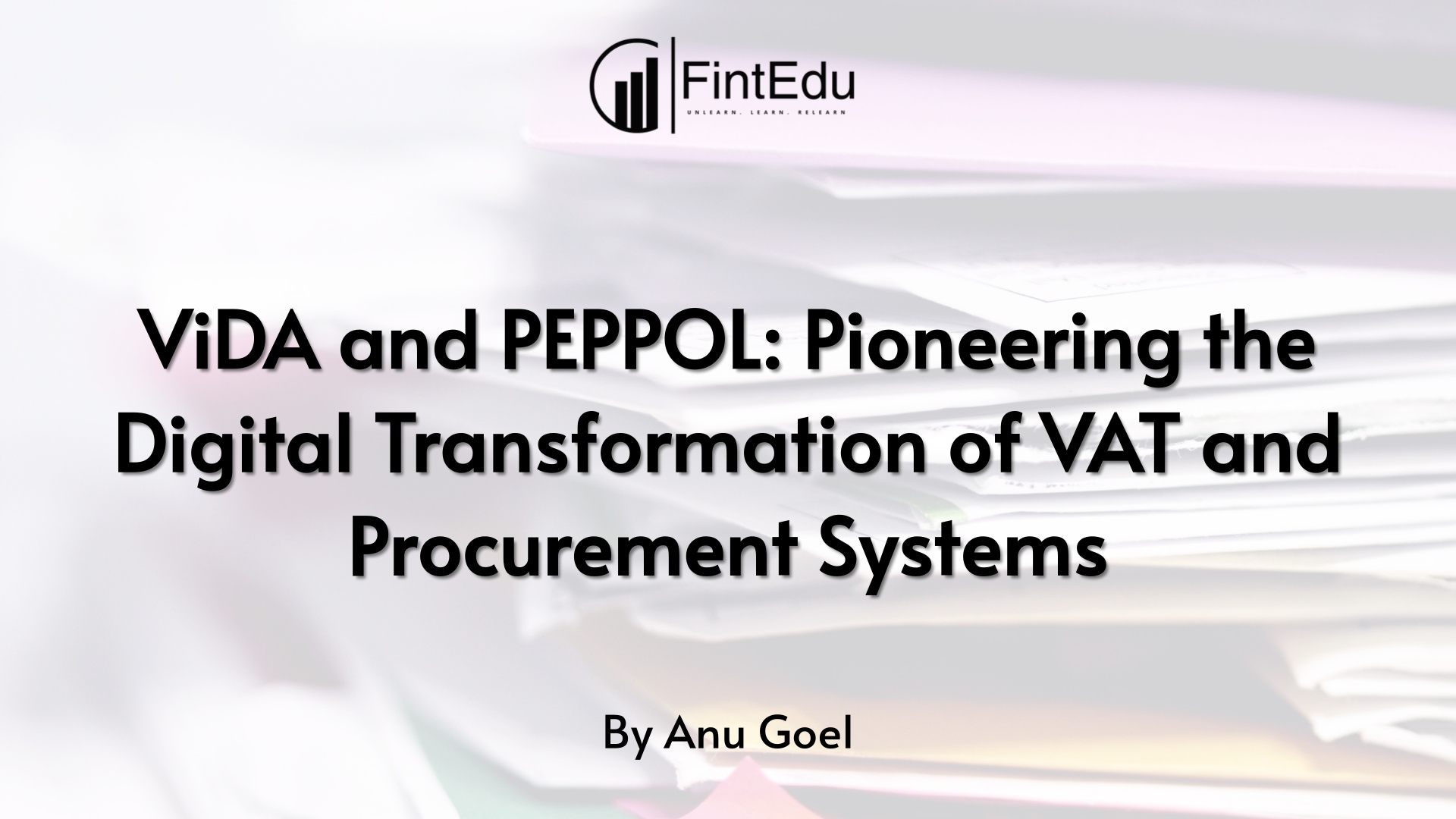LISTEN TO THIS ARTICLE
As the global economy increasingly embraces digital transformation, initiatives like ViDA (VAT in the Digital Age) and PEPPOL (Pan-European Public Procurement On-Line) are at the forefront of modernizing and streamlining financial processes. Both aim to enhance efficiency and transparency, but they serve distinct purposes within the realms of VAT compliance and procurement systems. This article provides an in-depth understanding of ViDA and PEPPOL, highlighting their key components, objectives, and differences.
Understanding ViDA (VAT in the Digital Age)
ViDA is a comprehensive proposal introduced by the European Commission to overhaul and modernize the VAT system within the European Union. It is designed to improve VAT collection efficiency, mitigate VAT fraud, and update VAT regulations to align with the digital economy.
Purpose: The initiative addresses the challenges posed by the outdated VAT system, which has not evolved in tandem with the digital economy's rapid growth. By integrating digital reporting and mandatory e-invoicing, ViDA aims to streamline VAT processes, enhance data accuracy, reduce administrative burdens, and empower tax authorities to better detect and prevent VAT fraud.
Key Components:
1.Mandatory E-Invoicing:
- Real-time transmission of invoice data to tax authorities.
- Simplifies the VAT reporting process for businesses.
- Enhances accuracy and timeliness of VAT data.
2.Digital Reporting Requirements:
- Standardizes the real-time reporting of transaction data.
- Provides tax authorities with timely, detailed information.
- Enables faster detection and prevention of VAT fraud.
3.Single EU VAT Registration:
- Simplifies VAT compliance across multiple EU countries.
- Eliminates the need for businesses to register for VAT in each member state where they operate.
- Facilitates easier VAT reporting and payment.
4.Regulation of the Platform Economy:
- Clarifies VAT obligations for digital platforms.
- Ensures proper VAT collection on transactions facilitated by platforms.
- Promotes fair competition between traditional businesses and digital services.
Exploring PEPPOL (Pan-European Public Procurement On-Line)
PEPPOL is an initiative aimed at facilitating cross-border e-procurement and e-invoicing within the EU and other participating countries. It establishes a standardized framework and network for electronic document exchange, enabling seamless communication between different systems.
Purpose: PEPPOL is designed to enable businesses to send electronic documents, such as invoices and purchase orders, across borders and different systems efficiently. This initiative streamlines procurement processes, reduces costs, and enhances efficiency in both public and private sectors.
Key Components:
1.PEPPOL Network:
- Connects various e-procurement and e-invoicing systems across Europe.
- Ensures standardized and secure exchange of electronic documents.
2.PEPPOL Standards:
- Provides technical standards and specifications for electronic document exchange.
- Ensures interoperability between different systems.
3.Access Points:
- Certified service providers that connect to the PEPPOL network.
- Facilitate the exchange of electronic documents between businesses and government entities.
Key Differences Between ViDA and PEPPOL
Feature
| ViDA (VAT in the Digital Age)
| PEPPOL (Pan-European Public Procurement On-Line)
|
Definition
| A proposal to modernize the VAT system within the EU
| An initiative to facilitate cross-border e-procurement and e-invoicing
|
Purpose | Modernize VAT system within the EU
| Facilitate cross-border e-procurement and e-invoicing
|
Key Components
| Mandatory e-invoicing, digital reporting, single EU VAT registration, regulation of the platform economy | PEPPOL network, PEPPOL standards, access points
|
Scope
| VAT compliance and administration within the EU | E-procurement and e-invoicing, used by both public and private sectors
|
Implementation
| Proposed by the European Commission, requires legislative approval and implementation by EU member states | Already in use, with established network and standards for electronic document exchange |
Objective | Enhance VAT collection efficiency, combat VAT fraud, adapt to digital economy | Enable standardized electronic document exchange across different systems and borders |
Target Audience | Businesses operating within the EU, tax authorities | Businesses and government entities involved in procurement |
Focus Area | VAT processes and compliance
| Electronic document exchange for procurement
|
ViDA and PEPPOL represent pivotal steps in the digital transformation of VAT and procurement systems, respectively. ViDA focuses on modernizing the VAT system within the EU, enhancing VAT compliance, and combating VAT fraud through digital reporting and e-invoicing. Conversely, PEPPOL facilitates cross-border e-procurement and e-invoicing by providing a standardized framework for electronic document exchange. Recognizing the distinctions between these initiatives is crucial for understanding their respective roles and impacts on the digital economy. Through these efforts, the EU aims to create more efficient, transparent, and advanced financial and procurement systems, setting a benchmark for global digitalization initiatives.
Disclaimer: Content posted is for informational and knowledge sharing purposes only, and is not intended to be a substitute for professional advice related to tax, finance or accounting. The view/interpretation of the publisher is based on the available Law, guidelines and information. Each reader should take due professional care before you act after reading the contents of that article/post. No warranty whatsoever is made that any of the articles are accurate and is not intended to provide, and should not be relied on for tax or accounting advice.



